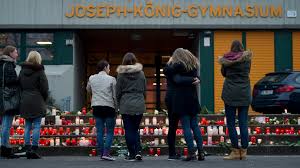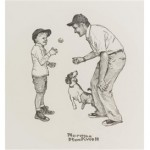The world is full of tragedies, sweeping and small. (It is also chock-a-block with morality plays, comedy and inspiration. But not in this column.) It is a curious study: what makes a tragic event from outside affect us, moves us to the core? No matter how compassionate one might be, it is at least insane-making (if not actually impossible) for a person to react with deep feeling to every bit of pain and grief that others experience. It’s a matter of psychic self-preservation, I suppose. To be too open, too desperately responsive to what goes on around us would be as crippling as its opposite, the utter disregard for the feelings and experiences of others.
The suffering of children, it would seem, is something most of us are wired to be distressed about. Some are never so moved by human difficulties as by the sorrows of pets. (After the tide of frothing condemnation for football star Michael Vick’s involvement in dog fighting, I read a searing comment from New Orleans. Would we have gotten more help after Katrina if the media had focused on the dogs instead of the people?) Much of our work as human beings, ultimately, is to develop the capacity to care about our neighbours, “to feel, in your heart’s core, the reality of others,” as the novelist Margaret Laurence once put it. To understand that the lives of others are just as important to them as our own lives, and the lives of our dearly beloved, are to us. What hits home when we hear or read of terrible misfortune? What is it that opens wide the gateway to empathy? (And while we’re on the subject, who ARE our neighbours?)
Usually, it’s something as simple as shared biographical detail. Wow. This person is kinda like me. And bad stuff happened to him. Ouch. “There, but for the grace of God, go I,” a more eloquent observer noted. When asked why he had responded so dramatically, how he had performed such an absurdly courageous deed, a winner of Canada’s Governor General’s Award for bravery put it this way: “I looked into that burning truck and I thought to myself, That guy is ME.” The dark inversion of this credo, though, is what allows us to kill in war, to ignore suffering, or simply to live comfortably when many do not: those people are not like us. Such a fine balance. I was struck forcibly by the matter of identification with others last weekend.
I was stunned by grief Saturday morning, quite instantaneously, hearing the first radio reports of a terrible highway accident near Bathurst, New Brunswick. Tens of thousands die every year on the roads, of course. It’s a price we’re willing to pay, as a society, for unlimited mobility. This was different, for me and for many, because of the scale and because of the youth of the victims. Eight dead. One fell and grinding swoop. Seven of them were among the leading young men of their high school, members of its varsity basketball team. And one was the coach’s wife. The coach, the driver of the passenger van on the cold and slippery Friday night, walked away from the carnage. The boys were playing a game I have loved and coached with eager hours, and suddenly this driver who walked away was me.
“Walked away”, we say, when someone survives an accident with little bodily damage. Wayne Lord didn’t “walk away”, though. He must’ve been screaming, running, searching. He must’ve been mad with grief and helplessness, seeing the shredded vehicle he’d lost control of, the broken bodies of his wife and of seven boys to whom he had given hours beyond measure, and encouragement, and extra laps, and technical instruction, help with their courses and advice about girlfriends. His daughter was in that van, too, what was left of it after hitting a transport truck head on just a minute or two from home. There was no walking away for Coach Lord.
Or for me, even thousands of highway clicks away, choking with emotion for people I’d never heard of, because I’ve been in that van. I was that teacher and basketball coach, bringing eight, ten, twelve young men – silly, sleepy, bruised, music playing, mainly happy even after a loss on the road – back home, back to their families. I am wounded by what this former stranger, this colleague, this brother, faces now. I broodingly imagine the hallways of that high school, knowing how the sudden deaths of fellow students and friends make a young person feel cut off at the knees, heart-sick and desperate. I remember the devastation in my own hometown high school after three young women were lost in a similar tragedy. For too many kids, with shaky families or non-existent religious convictions, the sudden loss of peers is more than that, as awful as that is for anyone. If my friends are gone for no reason, what’s the point of anything?
In my mind, I walk the streets of Bathurst. It’s probably much like the place where I grew up, lived, taught and coached. The McDonald’s has its flag at half mast, and attempts at community consolation where meal deals would normally be signed. I wept again when I saw this news photo: friends of the dead athletes had dragged two portable basketball hoops out to the highway to honour their buddies. A guy does what he can do, especially when there’s not much you can say and less that you can understand.
The truth of what I often used to say to my bemused players, or to friends who wondered why an apparently intelligent man would spend so much time with sweaty teens, comes back to me: There’s more to life than basketball, but then there’s more to basketball than basketball… There surely is in Bathurst, New Brunswick, these days, as they bury their sons, brothers, friends, and one wife. And what can be done about the heart of a bereaved husband, whose loss has been multiplied by the extinction of seven young lives that he had done so much to enrich and guide? Thank God his daughter lives and therefore he must, too. I hope that town wraps its arms around him, around her. I pray for consolation, as far down the road as that may seem.
I even dream that he may someday have the heart to blow a whistle again.


